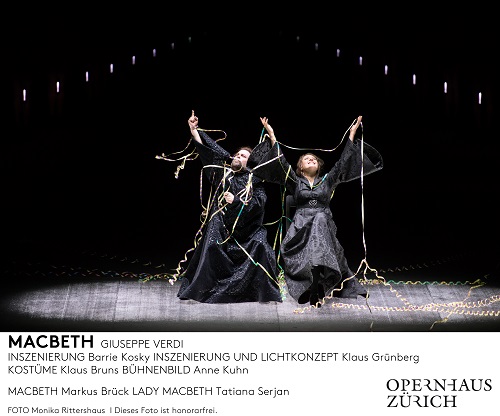 Switzerland Verdi, Macbeth: Soloists, Chorus of Opernhaus Zürich, Philharmonia Zürich, Teodor Currentzis (conductor), Opernhaus Zürich, 3.4.2016. (RP)
Switzerland Verdi, Macbeth: Soloists, Chorus of Opernhaus Zürich, Philharmonia Zürich, Teodor Currentzis (conductor), Opernhaus Zürich, 3.4.2016. (RP)
 Verdi, Macbeth
Verdi, Macbeth
Production:
Director: Barrie Kosky
Stage and Lighting Design: Klaus Grünberg
Costumes: Klaus Bruns
Chorus Master: Ernst Raffelsberger
Choreography: Teresa Rotemberg
Dramaturgist: Claus Spahn
Cast:
Macbeth: Markus Brück
Banquo: Wenwei Zhang
Lady Macbeth: Tatiana Serjan
Lady-in-waiting: Ivana Rusko
Macduff: Pavol Breslik
Malcolm: Airam Hernandez
Doctor: Dimitri Pkhaladze
Servant, Murderer: Erik Anstine
Barrie Kosky, taking his cue from Verdi, places the focus squarely on Macbeth and his lady in the Zurich Opera’s new production of Macbeth. It is their lust for power, mutual dependency and ultimate demise that stokes his imagination. He sought a set with a stark contrast between darkness and light. Klaus Grünberg obliged with total darkness, interrupted only by two parallel rows of small lights on either side of the stage extending into infinity. From the dark recesses, spirits emerged – naked men, women, hermaphrodites and other creatures from the nether world. Two large oblong light fixtures were the only source of illumination, casting a harsh, bright light on the scheming couple’s trajectory from triumph to death.
The audience also came upon the scene from total darkness. Then, the body of a man appeared, covered with ravens. There was total, unsettling silence. As the overture began, the spirits emerged from the darkness and slowly removed the birds from the body one by one. The man beneath was Macbeth. The ravens not only hovered over the dead, they observed the follies of men. A flow of their feathers symbolized death. The dark was alleviated only during the couple’s moments of glory, when streamers showered upon them, and they reveled in their triumph by wrapping themselves in the bright colors.
A production such as this, requires singing actors of extraordinary abilities. They must not only meet Verdi’s vocal demands, but also function on a totally different plane as actors, with no props or sets to help create an illusion. Markus Brück and Tatiana Serjan, richly robed, were able to enter this world, with detailed, nuanced characterizations that transcended the opera stage and entered Shakespeare’s theatrical realm. Vocally, Brück was the more complete embodiment of Verdi’s Macbeth. Serjan lacked only the abandon that the composer specified for Lady Macbeth. There was little of the “raw, strangulated, hollow” sound that the composer requested, but much beautiful, wondrous singing. The risks Serjan took as an actor were greater than those she took as a singer. With Brück, doubt, terror and exultation registered as intensely in his singing as it did in his acting.
Secondary characters were marginalized in Kosky’s imagining of the tale. One, however, emerged from the darkness: the Banco of Wenwei Zhang. He embodied nobility – tall, elegantly robed, with long locks and an imposing vocal presence. His spirit was the first to escape its mortal form in a flurry of black feathers. Pavol Breslik was simply miscast. He has a lyric tenor of exceptional beauty, but his voice lacks the gravitas for Macduff. Two minor characters had an impact beyond the size of their roles. Ivana Rusko as a lady in waiting and Dimitri Pkhaladze as the doctor served as a Greek chorus during the sleepwalking scene, intensifying the horror of their lady’s descent into madness with only their voices and the horror in their gazes.
Teodor Currentzis is quoted in the program booklet as saying that he is in love with the Philharmonia Zürich. It would seem that the feeling is mutual. He maintained constant focus and intensity throughout. Whether transparent and eerie or loud and terrifying, the orchestra played superbly. The chorus, for the most part faceless and hidden in the dark, had little to do but sing, and they did so admirably. Their sound was a vital component of the atmosphere in which the drama unfolded.
Only at the very end did the staging get muddled. Ostensibly for dramatic reasons, the final scene of the original 1847 Florence production, where Macbeth is murdered on stage, was grafted onto the Paris version of 1864, in which he dies offstage and there is a closing chorus. The dead Macbeth returned as an Everyman of sorts, dressed in black pants and a white undershirt with a few black feathers stuck on his back. Brück seemed adrift. Airam Hernandez’s Malcolm, the newly crowned king, left no impression at all. Where were the ravens when they were most needed?
The production was by any estimation a success. Kosky and his team are to be praised for the clarity of their vision and its powerful realization. The bravos and many rounds of applause were well earned.
Rick Perdian
